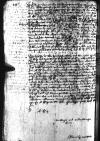Letter #3162
Ioannes DANTISCUS to Nikolaus FRIEDWALDHeilsberg (Lidzbark), 1547-07-16
Manuscript sources:
Auxiliary sources:
| ||||||||||
Text & apparatus & commentary Plain text Text & commentary Text & apparatus
Dem ersamen, namhaftigen herrn
Unsernn fruntlichenn grus und alles gutts tzuvoran. / Ersame und namhaftige herrn, / beszunders gutte freunde. /
Wie wir aus dem gesprech von
Datum aus unserm schlosse
